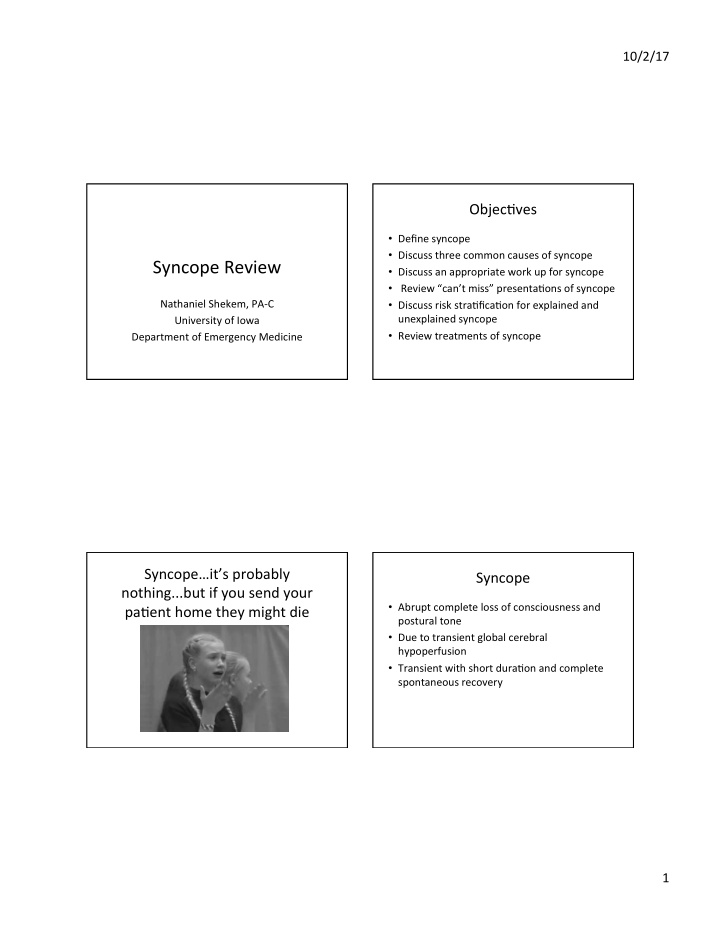



10/2/17 ObjecKves • Define syncope • Discuss three common causes of syncope Syncope Review • Discuss an appropriate work up for syncope • Review “can’t miss” presentaKons of syncope Nathaniel Shekem, PA-C • Discuss risk straKficaKon for explained and unexplained syncope University of Iowa • Review treatments of syncope Department of Emergency Medicine Syncope…it’s probably Syncope nothing...but if you send your • Abrupt complete loss of consciousness and paKent home they might die postural tone • Due to transient global cerebral hypoperfusion • Transient with short duraKon and complete spontaneous recovery 1
10/2/17 Epidemiology • 1-3% of ER visits • 1-3% of hospital admissions • 3-37% lifeKme prevalence • First peak 10-30 y/o • Second peak aXer 65 y/o Three Causes of Syncope Three Causes of Syncope • Reflex mediated 20% Cardiac • Cardiac 10% Reflex OrthostaKc • OrthostaKc 10% Mediated Hypotension • Unknown 40% 2
10/2/17 PaKent arrives aXer LOC… • ALL paKents get – Thorough history – Complete physical exam – EKG – +/- POC glucose 3
10/2/17 Pathophysiology Reflex Mediated Syncope • Triggered by inappropriate cardiovascular Heart Rate reflexes that that produce hypotension and/or Cardiac Output 10 seconds of bradycardia complete disrupKon • Young, healthy person that becomes nauseous, sweaty, light-headed with tunnel vision and abdominal pain aXer prolonged 35-50% standing exposed to pain, fear, anxiety reducKon cerebral perusion Blood pressure Vasovagal Syncope Reflex Mediated Syncope • Prolonged standing 37%, hot weather 42%, • Triggers lack of food 23%, fear/anxiety 21%, pain 14% – Vasovagal – CaroKd sinus syndrome/hypersensiKvity – SituaKonal 4
10/2/17 5
10/2/17 Reflex Mediated Syncope • Diagnosis – Stop with typical history, benign exam, normal EKG, no heart disease or other red flags – Tilt table tesKng (Sns 26-80%, Spc 90%) for vasovagal – OutpaKent cardiac rhythm monitoring 6
10/2/17 Reflex Mediated Syncope • Treatment – Reassurance – Avoid triggers – Counterpressure maneuvers – Midodrine – Pacemaker • Severe recurrent cardioinhibitory reflex syncope Cardiac Syncope Cardiac Syncope • Structural cardiopulmonary disease • Most likely to causes syncope – Valvular, cardiomyopathy, congenital, pericardial, – Ventricular tachycardia MI/ischemia, pericardial, PE, pulm htn, dissecKon – SVT with accessory pathway • Dysrhythmias – Sinus bradycardia (less than 35 BPM) – Tachyarrhythmia, bradyarrhythmia, AV – Sinus pauses (greater than 3 seconds) dysfuncKon, channelopathies – Heart block (second or third degree) – Atrial fibrillaKon with slow ventricular response 7
10/2/17 Cardiac Syncope Cardiac Syncope • 1 year mortality 18-33% • History • Mortality increases with severity of heart – CAD, HF, valvular disease, family history, exerKonal syncope, supine/sikng syncope, risk disease factors for cardiovascular disease – CHF 1-2, OR 7.7 – CP, SOB, palpitaKons preceding syncope – CHF 3-4 13.5 • Exam • With dilated cardiomyopathy, 30% of – HR, BP, palpitaKons, S3 gallop, JVD/edema, subsequent SCD from presumed crackles, murmur arrythmogenesis EKG in syncope • Yield is about 5%, but non-invasive, inexpensive and helps risk straKfy • Without typical features of reflex or orthostaKc hypotension, an abnormal EKG increases the odds raKo of cardiac arrhythmia OR 23.5 8
10/2/17 Intraventricular ConducKon Delay • QRS duraKon > 120 seconds – LBBB, RBBB, LAFB, LPFB – LeX or right ventricular hypertrophy – Dilated cardiomyopathy – Hyperkalemia – Sodium-channel blocker toxicity – WPW – Brugada – ARVD 9
10/2/17 10
10/2/17 11
10/2/17 12
10/2/17 Other TesKng for Cardiac Syncope OrthostaKc Hypotension • Echocardiogram – LV funcKon (EF), cardiac structure, valvular funcKon • Exercise stress tesKng with EKG – CP or SOB with syncope, exerKonal syncope • Cardiac monitoring – Telemetry, Holter, ELR, ILR • Electrophysiological tests – Unexplained syncope with prior MI, structural heart disease, impaired LV funcKon, SN/AV/bifasicular block – Elicit tachyarrhythmia and find accessory pathways 13
10/2/17 OrthostaKc Hypotension Causes of OrthostaKc Hypotension • 20% of paKents over the age of 75 • Hypovolemia – 54—68% insKtuKonalized vs 6% community – DehydraKon, blood loss dwelling • Autonomic insufficiency • Occurs in response to sudden postural change – Primary, secondary, prolonged immobilizaKon – Prodromal symptoms similar to reflex mediated • MedicaKons symptoms – BB/AB, CCB, ACE/ARB, diureKcs, nitro/PDEI, psych • OXen exacerbated by prolonged standing, • Post-prandial exerKon, warm temperatures and meals – Especially large carbohydrate meal and alcohol OrthostaKc Vital Signs Autonomic Nervous System TesKng • ObjecKve evidence of autonomic failure and • Greater than 20 mm Hg decrease in systolic or predisposiKon to neurally mediated syncope 10 mm Hg diastolic pressure within three • ParasympatheKc Nervous System minutes of standing – Heart rate variability with deep inspiraKon and Valsalva • Greater than 30 BPM increase in pulse within • SympatheKc Cholinergic FuncKon 3 minutes of standing (Sns 97% and Spc 98% – Thermoregulatory sweat response, quanKtaKve for large volume loss) sudomotor axon reflex test • SympatheKc Adrenergic FuncKon • Neither BP or HR is sensiKve for moderate – Blood pressure response to Valsalva and Klt table test volume loss with beat to beat blood pressure measurement 14
10/2/17 Treatment for OrthostaKc Hypotension • NS bolus • Increase PO water and salt intake • Blood transfusion for acute blood loss • DisconKnue offending medicaKon • Stand up slowly, avoid large meals, avoid excessive heat, waist high support hose • Midodrine 15
10/2/17 Other Syncope “Can’t Miss” Diagnoses 16
10/2/17 17
10/2/17 DifferenKal Diagnosis • Seizure • Neurologic • Hypoglycemia • Trauma • IntoxicaKon • Cataplexy • Psychiatric Syncope Versus Seizure • Classic seizure – Aura, loss of postural tone, tonic-clonic acKvity, inconKnence, and prolonged post-Kctal period • 90% of syncopal episodes are are associated with myoclonic jerks 18
10/2/17 DifferenKal Diagnosis • Seizure • Neurologic • Hypoglycemia • Trauma • IntoxicaKon • Cataplexy • Psychiatric Explain It To Your PaKents QuesKons? Heart Rate Cardiac Output 10 seconds of complete disrupKon 35-50% reducKon cerebral perusion Blood pressure 19
Recommend
More recommend